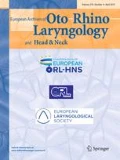Abstract
This study was performed to analyze clinical and audiologic characteristics of sensorineural tinnitus and to investigate the associating factors reflecting psychological aspects of stress and depression of the patients. This is a retrospective analytical study conducted in a tinnitus clinic of a tertiary referral center of a university hospital. The medical records of 216 patients suffering from sensorineural tinnitus were thoroughly evaluated to determine correlations between clinical and audiological characteristics, including age, sex, predisposing or etiologic factors, hearing levels up to extended high frequencies, and tinnitus severity. Psychological aspects of stress and depression were also evaluated and analyzed to seek the associations with tinnitus severity. All data were stored in our database bank and were statistically analyzed. Our study subjects showed a slight male predominance. The highest percentage of tinnitus was found in patients of 60–80 years old. Only 32.5 % of tinnitus patients were subjectively aware of their hearing loss, whereas 73 % of subjects had hearing deficits in some frequencies in their audiogram. Hearing impairments were of the low-frequency sensorineural type in 18.2 % of patients and were limited to the high frequencies in 77.9 % of patients. Tinnitus was unilateral in 51 % of patients and had a tonal nature in 45 % of patients. In total, 45.8 % of patients with high-frequency sensorineural hearing loss had high-pitched tinnitus. There were significant correlations between tinnitus severity, loudness and annoyance. Correlations with THI (Tinnitus Handicap Inventory) and Beck depression index scores were also found. Sensorineural tinnitus was related with hearing loss in some frequencies nevertheless of patients’ own awareness of hearing loss. Loudness and annoyance of tinnitus seems to be two important factors reflecting psychological problems of patients’ stress and depression.

Similar content being viewed by others
References
Xu X, Bu X, Zhou L, Xing G, Liu C, Wang D (2011) An epidemiologic study of tinnitus in a population in Jiangsu Province, China. J Am Acad Audiol 22:578–585
Hoekstra CE, Wesdorp FM, van Zanten GA (2014) Socio-demographic, health and tinnitus related factors associated with tinnitus severity. Ear Hear 35:544–554
Gopinath B, Rochtchina E, Karpa MJ, Mcmahon CM, Mitchell P (2010) Risk factors and impacts of incident tinnitus in older adults. Ann Epidemiol 20:129–135
Moller AR (2007) Tinnitus: presence and future. Prog Brain Res 166:3–16
Shargorodsky J, Curhan GC, Farwell WR (2010) Prevalence and characteristics of tinnitus among US adults. Am J Med 123:711–718
Kähärit K, Zachau G, Eklöf M, Sandsjö L, Möller C (2003) Assessment of hearing and hearing disorders in rock/jazz musicians. Int J Audiol 42:279–288
Nicolas-Puel C, Faulconbridge RL, Guitton M, Puel JL, Mondain M, Uziel A (2002) Characteristics of tinnitus and etiology of associated hearing loss: a study of 123 patients. Int Tinnitus J 8:37–44
Kim DK, Park SN, Kim HM, Son HR, Kim NG, Park KH et al (2011) Prevalence and significance of high-frequency hearing loss in subjectively normal-hearing patients with tinnitus. Ann Otol Rhinol Laryngol 120:523–528
Halford JB, Anderson SD (1991) Anxiety and depression in tinnitus sufferers. J Psychosom Res 35:383–390
Andersson G, Lyttkens L, Larsen HC (1999) Distinguishing levels of tinnitus distress. Clin Otolaryngol Allied Sci 24:404–410
Henry JL, Wilson PH (1995) Coping with tinnitus: two studies of psychological and audiological characteristics of patients with high and low tinnitus-related distress. Int Tinnitus J 1:85–92
Holgers KM, Zoger S, Svedlund K (2005) Predictive factors for development of severe tinnitus suffering-further characterisation. Int J Audiol 44:584–592
Ooms E, Meganck R, Vanheule S, Vinck B, Watelet JB, Dhooge I (2011) Tinnitus severity and the relation to depressive symptoms: a critical study. Otolaryngol Head Neck Surg 145:276–281
Wallhäusser-Franke E, Brade J, Balkenhol T, D’Amelio R, Seegmüller A, Delb W (2012) Tinnitus: distinguishing between subjectively perceived loudness and tinnitus-related distress. PLoS ONE 7:e34583
Lindberg P, Scott B, Melin L, Lyttkens L (1987) Long-term effects of psychological treatment of tinnitus. Scand Audiol 16:167–172
Lindberg P, Scott B, Melin L, Lyttkens L (1988) Behavioral therapy in the clinical management of tinnitus. Br J Audiol 22:265–272
Hiller W, Goebel G (2006) Factors influencing tinnitus loudness and annoyance. Arch Otolaryngol Head Neck Surg 132:1323–1330
Al-Mana D, Ceranic B, Djahanbakhch O et al (2009) Hormones and the auditory system: a review of physiology and pathophysiology. Neuroscience 153:881–900
Author information
Authors and Affiliations
Corresponding author
Ethics declarations
Conflict of interest
There was no conflict of interest or problems on compliance and ethical standards.
Rights and permissions
About this article
Cite this article
Al-Swiahb, J.N., Hwang, E.S., Kong, J.S. et al. Clinical and audiologic characteristics of patients with sensorineural tinnitus and its association with psychological aspects: an analytic retrospective study. Eur Arch Otorhinolaryngol 273, 4161–4165 (2016). https://doi.org/10.1007/s00405-016-4108-0
Received:
Accepted:
Published:
Issue Date:
DOI: https://doi.org/10.1007/s00405-016-4108-0




